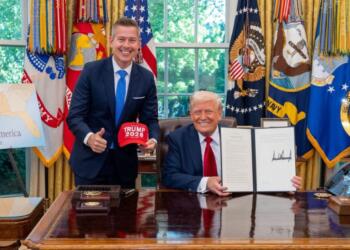
In the next negotiation of the Treaty between Mexico, the United States and Canada (T-MEC) , scheduled for 2026, “we are going to move forward,” said Marcelo Ebrard , head of the Ministry of Economy , who considered that this trade agreement has been “a great business and a great success,” where Mexico has a favorable trend in several areas.
At the Mexico Trade Policy Stance conference , Ebrard indicated that our country is entering a new era in its relationship with its northern neighbor , and recalled that six years ago, when the agreement was being negotiated, it was also with President-elect Donald Trump , and whose starting point was that the then North American Free Trade Agreement (NAFTA) had been the worst agreement on the matter in history, so they faced a complicated scenario.
He said things are different now because there is a consensus in the United States regarding protectionism and China. “It is no longer just the design of a policy of an incoming administration, it is a central political consensus that will direct the destiny of the economy at a global level.”
At the 2025 Economic Outlook Seminar , organized by the Association of Alumni of the Autonomous Technological Institute of Mexico (ITAM) , Ebrard said that since the signing of the T-MEC, Mexico has done well so far, as has the United States.
In this regard, he shared some data that show the positive results of this trade agreement, including that the United States and Canada have more than 15 thousand manufacturing plants in our country , as well as that regional trade is 1.8 billion dollars , which represents an increase of 54% compared to 2019.
He stressed that the USMCA generates approximately 3.1 million dollars (mdd) per minute, making it “the best investment we have made.”
In his presentation, he gave as an example that of the main automotive importing companies in the United States ( General Motors , Stellantis and Ford ), 35% of the content of the vehicles assembled in Mexico is of American origin.
“It has been a great business, which explains why these companies have been able to survive, and we are now going to enter a scenario of greater competition for these companies, where any change you make in their relative costs will be a strategic disadvantage for the United States,” he stressed, and emphasized that Mexico is the leading importer and exporter of the United States.
Mexico is in a situation of economic strength , said Marcelo Ebrard, who pointed out that the unemployment rate in the country is lower than that of its northern neighbor, while foreign investment is historic for our country, reaching 35,737 million dollars , an increase of 9% over 2023.
Based on these figures, “you are entering into a negotiation where you are not in a situation of economic weakness that could put you in a more fragile negotiation,” said the head of the Economy, who highlighted that the increase in industrial and commercial construction is notable, and that Mexico is the 12th economy in the world .
Regarding security and migration, which will be part of the topics to be discussed in the USMCA negotiations, he said that deaths from fentanyl have been decreasing, so the trend is favorable, since Mexico has contributed to this reduction. “If this continues, it means that the security issue in the conversations is on a favorable trend for your counterpart, for your interlocutor,” he said.
Regarding arms control, Mexico will propose a symmetry in the effort to reduce its trafficking , since according to data from Customs and Border Protection (CBP) , from October 1, 2024 to January 1, 2025, Mexico has seized 3,602 firearms.
“The trend, thinking about our interlocutor in terms of security on this issue, is fortunately improving and the main issue that Mexico is raising is to help me control weapons,” he said.
During his participation, Marcelo Ebrard recalled that Foxconn is the main importer from China to Mexico, and is therefore a key partner that “will be a partner of Nvidia due to its installation in Jalisco.” He also said that General Motors is the main importer from the United States to Mexico.
Finally, he questioned the “aggressive” protectionist strategy in relation to Mexico and China, and assured that it is not possible to maintain low inflation and sustained growth with the United States. “If you are simultaneously very protective of Mexico and China, it is not compatible.
Meanwhile, Arturo Fernández , rector of ITAM, said that the economic outlook for 2025 is uncertain, bringing technological advances such as Artificial Intelligence (AI) and the United States-China trade conflict, which could be counterproductive for global supply chains.
The imposition of US tariffs will strengthen the dollar and improve the terms of trade to the detriment of other countries, he said, noting that Donald Trump’s mercantilism reflects his concern about trade deficits.
Mexico’s situation is delicate given the threats of the next US president , and he pointed out that the USMCA should be maintained for the benefit of both nations, so our country must be successful in the following negotiations. In addition, he suggested that talks be initiated to sign economic treaties with other countries, such as Korea, and said that distancing itself from the Chinese economy would have some repercussions for Mexico.
To address public policy problems, a broad debate is needed, he said, and indicated that tax collection, mainly of the Value Added Tax (VAT), must be improved.
Comment and follow us on X: @Eliseosfield / @GrupoT21















